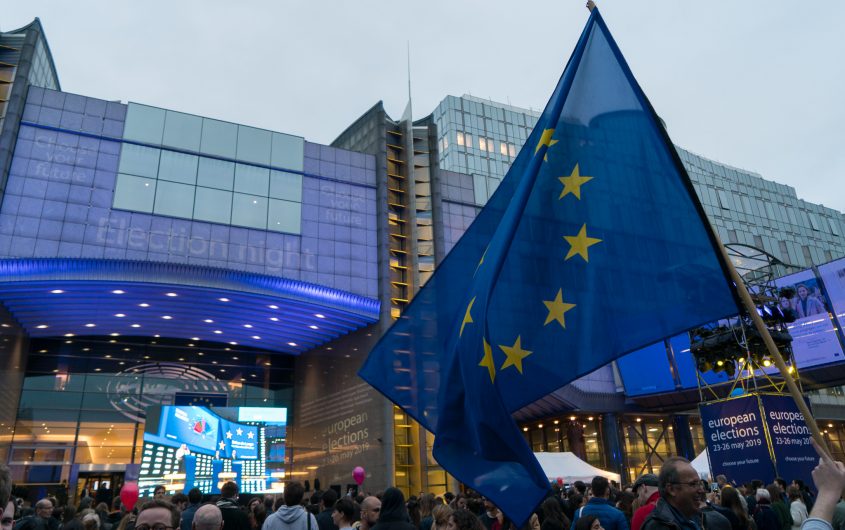
CC-BY-4.0: © European Union 2019 – Source: EP via Flickr
The AfD’s Path to Salvini: Winding, Yet Predictable

Lucas Dolan
American University
Lucas Dolan is a PhD Candidate at American University’s School of International Service. His research is broadly concerned with the role of transnational activist networks in reshaping international order. In his current research project, he examines the emergence of a transnational right-wing populist movement and its influence in German and American domestic politics. His commentary on populist politics has appeared in Duck of Minerva and The New York Times.
Mr. Dolan learned German as a Kathryn Davis Fellow for Peace at the prestigious Middlebury College Summer Language Schools. He studied network analysis at the Inter-University Consortium for Political and Social Research (ICPSR) Summer Program, an internationally recognized quantitative methods program. Before starting graduate school, he worked as an intern at the U.S. Embassy in Berlin.
He is a 2018-2019 participant in AICGS’ project “A German-American Dialogue of the Next Generation: Global Responsibility, Joint Engagement,” sponsored by the Transatlantik-Programm der Bundesrepublik Deutschland aus Mitteln des European Recovery Program (ERP) des Bundesministeriums für Wirtschaft und Energie (BMWi).
Earlier this month, the creation of the right-wing populist European Parliament group “Identity and Democracy” (ID) was officially announced. With the Alternative for Germany sending eleven Members of the European Parliament (MEPs) to participate in ID, this marks the first time a substantial German delegation will sit with an officially sanctioned coalition of right-wing populist parties. While the 73 MEPs of the ID is a major improvement from the 37 of its predecessor group, Europe of Nations and Freedom (ENF), it falls well short of the widely circulated expectation of becoming the second or third force in the Parliament.
In April, Italy’s Matteo Salvini held a press conference announcing his plans for a new European Parliament group (then tentatively titled Europe of Peoples and Nations). Salvini appeared with representatives of the Danish People’s Party and Finns Party, along with Jörg Meuthen of the AfD. Much of the expert commentary was focused on the Danes and Finns. The decisions of the Danes and the Finns were unexpected because they contradicted a longstanding strategy of seeking mainstream respectability and establishing Scandinavian solidarity. Now they were turning their back on that, not long after Sweden Democrats had finally joined them in the European Conservatives and Reformists group (ECR).
The Scandinavian decisions may have been the most surprising, but the AfD’s decision to throw-in with Salvini and his allies was most significant. Because of the two party splits that occurred in the AfD, between 2014 and 2019 its representation in the European Parliament had been significantly deflated—failing to reflect its increasing share of power in German politics. Of the seven MEPs elected to the AfD in 2014, the contemporary party held only one by the end of the mandate. Now, even with a relatively modest showing in the election, Meuthen will bring back eleven MEPs, making the AfD the third largest force in the new ID group, trailing only Salvini’s Lega and Le Pen’s National Rally.
Part of the reason the AfD’s alliance with Salvini attracted little attention was that, by the time it happened, developments in the party had made it a foregone conclusion. But, looking back over the history of the AfD’s international interactions over the past few years offers a very different story. Attempts by party leaders and prominent members have been nearly uniform in producing internal rifts within the party, as well as international pressure.
In March of 2016, Beatrix von Storch and Marcus Pretzell were asked to leave the ECR. Von Storch left voluntarily and joined Farage’s Europe of Freedom and Direct Democracy (EFDD), while Pretzell waited, forcing the group to formally expel him, before joining the ENF. It was the controversy surrounding the idea of firing on migrants at the German border—including comments by von Storch and Pretzell—that grabbed headlines, but the ultimate deal-breaker was the AfD’s growing association with the FPÖ, signified by the parties’ formation of a “blaue Allianz” in Düsseldorf.
When Petry met with Heinz-Christian Strache atop the Zugspitze in June 2016, Georg Pazderski and Alice Weidel circulated a letter denouncing the meeting as an act of individual “self-promotion.” In the aftermath of the Koblenz summit of ENF members in January 2017, Pazderski again criticized Petry and Pretzell for appearing alongside Le Pen. This time Meuthen himself also offered criticism, saying of the event: “That is a pure ENF matter that has nothing to do with the AfD.”
Slowly, the critics of these associations seemed to come around. In March 2018, former critic Alice Weidel joined Beatrix von Storch in meeting with Steve Bannon in Zurich. This time Alexander Gauland spoke out not only criticizing Bannon’s European initiative, but also suggesting that in principle the interests of the European right were too divergent to be united.
The AfD’s path finally gained clarity when Jörg Meuthen seemed to come around to the necessity of cooperation with other parties of the populist right. In January 2019, POLITICO Europe reported that Meuthen was increasingly close with the Rassemblement National’s European Parliament leader, Nicolas Bay, a relationship supposedly fostered by the FPÖ as intermediary. A few months later, Meuthen appeared at the press conference with Salvini and now we know the AfD will officially sit in the new ID group.
The AfD, or at least factions of it, seem to have resisted the idea of sitting with ENF parties as long as possible. This happened despite the fact that for several years this has been the only plausible outcome. The party has a hostile history with the ECR due to the controversies that led to the AfD’s removal from the group. Even if Farage is successful in reviving his EFDD, this group is unlikely to survive post-Brexit, and thus lacks any long-term sustainability. Falling in with an updated ENF was the only logical choice. It seems likely that—as internal infighting in the AfD died down—international associations stopped being an opportunity to attack party rivals and became a necessity of being a more responsible mature party seeking influence at the European level.








